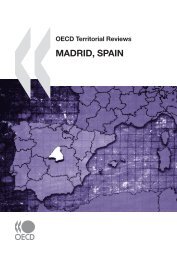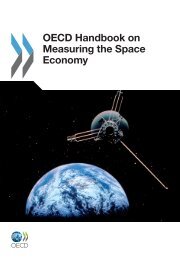Evaluating Country Programmes - OECD Online Bookshop
Evaluating Country Programmes - OECD Online Bookshop
Evaluating Country Programmes - OECD Online Bookshop
Create successful ePaper yourself
Turn your PDF publications into a flip-book with our unique Google optimized e-Paper software.
<strong>OECD</strong> 1999<br />
<strong>Country</strong> Assistance Strategies as a Management and Evaluation Instrument for Donors<br />
The relationship between country programme evaluations<br />
and project evaluations<br />
The preceding remarks show that the evaluation of a country programme and<br />
the evaluation of individual projects belonging to a country programme complement<br />
one another.<br />
– <strong>Country</strong> programme evaluations certainly cannot replace project evaluations.<br />
Much of the information needed to answer the above-mentioned<br />
questions with regard to the rationale, goal achievement, impact, effectiveness<br />
and sustainability of country programmes has to be distilled from the<br />
evaluation of the projects that make up the country programme. Furthermore,<br />
one should bear in mind that projects (even when they are part of a<br />
coherent strategy) often involve different partners (financing, executing and<br />
implementing agencies) and hence different accountabilities which require<br />
specific monitoring and evaluation.<br />
– On the other hand, a country programme evaluation is not just the sum of the<br />
evaluations of the individual projects. The starting point and frame of reference<br />
of a country programme evaluation has to be the corresponding country<br />
concept.<br />
– Except in the case of isolated projects which are not part of an integrated<br />
approach in a priority area, the evaluation of individual projects cannot be<br />
meaningful without a look at the country concept or the priority area strategy<br />
paper. This goes particularly for assessing the (intended) impact of a project<br />
which should be defined in the country concept.<br />
Final remarks<br />
This chapter has focused on the crucial role that the BMZ’s country concepts<br />
can and should play in the evaluation of country programmes of German development<br />
co-operation. The preceding sections call for two final remarks:<br />
– It has to be recalled that the BMZ’s country concepts are only binding for official<br />
financial and technical assistance. For the development co-operation<br />
programmes of German non-governmental organisations, the BMZ’s country<br />
concepts are just an orientation, despite the funding the NGOs receive from<br />
the BMZ budget. Consequently, the BMZ’s country concepts do not provide<br />
the same yardstick or frame of reference as in the case of official development<br />
assistance when it comes to the evaluation of the NGOs’ involvement<br />
in a country programme. In practice, much depends on how the term “orientation”<br />
is understood and applied by both the BMZ and the NGOs.<br />
– Of course, the evaluation of a country programme does not presuppose the<br />
existence of a formal country concept as discussed in our second section.<br />
Currently about 90 developing countries receive official financial and<br />
205

















![CQE=U]^\]Z: KAZAKHSTAN - OECD Online Bookshop](https://img.yumpu.com/3915768/1/190x253/cqeuz-kazakhstan-oecd-online-bookshop.jpg?quality=85)